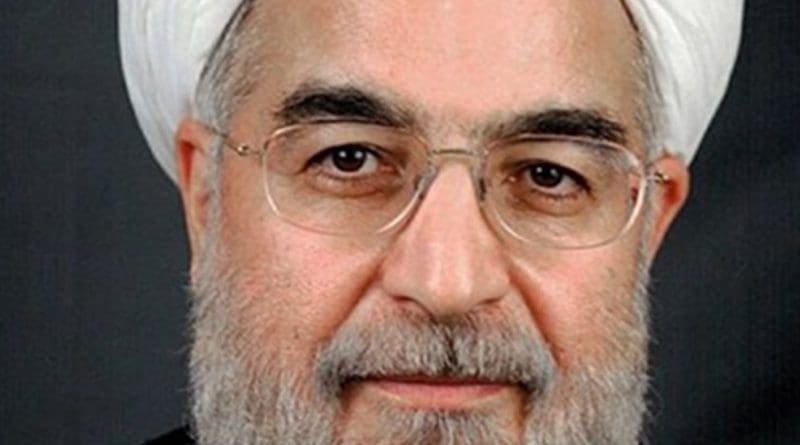Iran Viewpoint: What Brought The West To The Table – OpEd
There is a widespread Western fallacy that “sanctions brought Iran to the table,” which serves to legitimize the unjust regime of sanctions imposed by the Western governments, who rationalize their action by claiming to be the “injured parties” under international law, with respect to Iran’s alleged “non-compliance” with its international obligations.
The problem with this perspective that has acquired the status of a self-evident truth in the Western media is that it adopts the rhetoric of Western governments at face value, without the slightest inquiry on what caused the US and other Western governments involved in the nuclear negotiations with Iran to also ‘come to the table,’ that is, make reciprocal concessions?
The answer to the above question is three-fold. First, the idea that the Iran sanctions have caused little or no pressure on the Western countries is, of course, suspect and can be easily debunked. On the contrary, it can be shown that the whole edifice of sanctions regime was experiencing growing pressures and the Geneva agreement reflected a break not only for Iran but also the very sanctioning regimes, above all the US and European Union (EU).
To elaborate, given the fact that Iran’s nuclear progress had continued unabated despite the escalation of sanctions since 2006, the US was poised to pass new sanction laws targeting Iran’s oil sector, which if passed would have adversely affected US’s relations with some of its own trade partners such as India and China. In the absence of a deal in Geneva last November, the US lawmakers would have for sure enacted the new legislation, which would have instantly introduced new distortions in global trade, further violating the WTO norms on free trade. In other words, the Geneva agreement was a timely rescuer for the Western sanctioning states, avoiding a deterioration of their relations with Iran’s energy partners.
Second, by the time of Geneva agreement the unilateral European sanctions had come under increasing scrutiny by various courts in Europe, which had struck down a growing number of banks, trading companies, and individuals from the sanctions list. The significance of these adverse rulings, dreaded by the US officials who lobbied unsuccessfully to prevent them, was that it questioned the legality of some aspects of the EU sanctions that went far beyond the scope of UN sanctions on Iran, thus reflecting the irrefutable legal gap between UN and unilateral sanctions.
Third, in addition to the pressure of ‘market-distorting’ Western sanctions on the sanctioning powers, who deprived their own corporations from conducting profitable business with Iran, much to the delight of their Asian competitors, another important factor that ‘brought the West to the table’ was indeed the impressive pace of Iran’s nuclear progress. As a result of this steady progress, reflected in Iran’s ability to manufacture fuel rods for its medical reactor by enriching uranium up to 19.75%, i.e., the upper limit of low-enrichment, the West was suddenly jolted into the realization that Iran had reached a new nuclear milestone warranting serious negotiation.
Connected to this at the same time was the lessening value of the “military card” in West’s hands, in light of Iran’s construction of the underground facility known as Fordo, which is relatively immune from aerial bombardment, compared to the above-ground Natanz facility. This instantly jettisoned the “Osirak option,” that is the Israeli scenario of knocking down Iran’s facilities they way they did with ease against Iraq in 1981, thus adding to the futility of military threats against Iran. Needless to say, Iran’s counter-threat of closing the Hormuz and retaliating against any attacks throughout the region and beyond, i.e., the doctrine of extended deterrence, was an effective response that raised the potential cost of any military adventures against Iran. A good deal of this successful Iranian counter-strategy hinged on Iran’s extensive preparations for “asymmetrical warfare” and reliance on missile defense, given the impressive Iranian advances in missile technology.
Notwithstanding the above-said, it is hardly surprising that faced with Iran’s steady nuclear progress despite the sanctions that had harmful effects on the Western economy and entailed exorbitant monitoring costs, the West agreed to climb down its maximalist demands on “zero centrifuges” and to tacitly recognize Iran’s right to a civilian fuel cycle.
Of course, this explanation does not preclude the argument that the escalation of sanctions adversely affected Iran’s economy and spurred the new government of Hassan Rouhani to prioritize the lifting of sanctions through good-faith and principled negotiations. As an “injured party” whose inalienable nuclear rights have been abridged by Western discrimination and punitive actions, Iran’s anti-sanctions quest is in line with the nation’s national interests. But, while so much attention has been paid to Iran’s motivation to ‘make a deal’ unfortunately so far little attention has been paid to the underlying reasons for the West to reciprocate Iran’s action and thus explore the feasibility of a “win-win” scenario.
In terms of the regional and global geostrategic context, there are undeniably a host of relevant factors such as the withdrawal of US and NATO forces from the region after a decade of costly intervention and the related concerns for stability ‘the day after’ their planned departure, i.e., issues of direct link to Iran’s role in regional stability. Altogether, the net of Western interest to deal with Iran and search for ‘common grounds’ has been expanding and, naturally, one must probe the various economic, political, and geostrategic interests and concerns of the Western governments led by the US in determining why these powers consented to an interim deal with Iran, which has triggered the current negotiations for a long-term agreement? Suffice to say that the Western media’s failure to pay attention to this side of equation fuels a Western misperception that focuses on Iran’s purported weaknesses due to the sanctions, without bothering to present a comprehensive picture that, as outlined above, presents a vastly different, and more complex, picture before us, with clear policy connotations.

